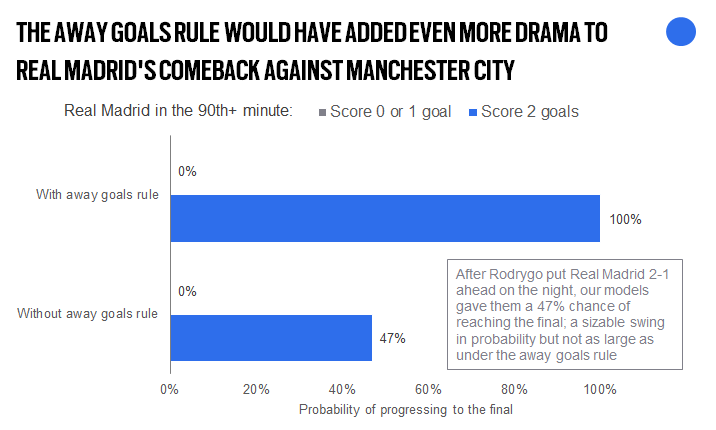Thought Leadership
No away goals, less jeopardy? How the removal of the away goals rule has impacted European competition
9 MIN READ
Thought Leadership
Inspired by what you’re reading? Why not subscribe for regular insights delivered straight to your inbox.
Ahead of the UEFA Champions League semi finals, Twenty First Group Chief Intelligence Officer Omar Chaudhuri spoke to BBC Radio 5 Live about the away goals rule, which was abolished ahead of the 2021/22 season.
During the segment, Omar advocated for it to be reinstated, on the basis that it increased jeopardy within knockout ties. You can listen to the segment below.
In order to measure the impact that the removal of the away goals rule has had, we’ve analysed some of the numbers emerging from the 2021/22 season.
Increased jeopardy
As we know, jeopardy is a key component in generating interest and excitement for a competition, and ultimately commercial value. In terms of jeopardy, the away goals rule gave football something that did not exist in any other type of competition: goals that could turn defeat instantly into victory.
The away goals rule helped deliver not just the Champions League’s greatest ever moments, but arguably European football’s too. Without the away goals rule we wouldn’t have had the drama of tie-progressing goals like Lucas Moura’s last minute goal for Tottenham Hotspur against Ajax. which took Spurs from the brink of semi-final heart-break to their first ever Champions League final, the incredible scenes in Rome when Kostas Manolas famously headed Roma in front on away goals against Barcelona in 2018 to advance to the semi-finals, or Sergi Roberto’s injury time winner for Barcelona against PSG in 2017; to name a few recent examples.
Introduced as a tiebreaker, the rule originally ensured that a coin toss was no longer required to separate tied teams. That it might encourage away teams to attack was a secondary benefit, which ultimately never materialised – away team goalscoring never increased as a result of the rule (nor did it negatively impact home team goals).
It did, however, have a third benefit: heightened jeopardy.
The swing of jeopardy provided by the away goals rule can be illustrated by Real Madrid’s incredible late comeback against Manchester City in this season’s semi finals. While it is impossible to know how the tie may have played out with the rule, TFG’s match probability model shows how much larger the swing delivered by Rodrygo’s brace would have been with the rule in place.
While the manner and timing of Rodrygo’s double cannot be underestimated, had the second been a tie progressing goal – rather than a goal that took the tie to extra time – the levels of drama would have been elevated further, showcasing the extra levels of jeopardy the away goals provided.
A new problem?
The removal of the away goals rule has however led to an unintended consequence. Teams that are at home in second leg ties are now benefiting from an additional 30 minutes of home advantage without the away team benefitting from any counterbalance measure.
As it happened, the away goals rule proved to be an effective leveller of home advantage in extra time. Between 2003 and 2021, in 239 UEFA club competition matches that went to extra time, home teams progressed in 52% of ties, reflecting a small advantage that is partially driven by seeding (though two teams that are level after 180 minutes are likely to be of similar quality).
However, in 40 ties this season, the home team has advanced 60% of the time. Excluding penalty shootouts from both figures, home teams have progressed outright via extra time in 35% of ties this season compared to 29% with the away goals rule.
While not enough ties have yet been played to determine whether this is significant, the early evidence points to it now being a small advantage for teams who play the second leg at home – something that is randomly assigned in the quarters and semi-finals of European competition.
It will be interesting to see whether this trend continues over the coming seasons in the continued absence of the away goals rule.
If you would like to find out more about how the removal of the away goals rule has impacted European football competitions please get in touch with Omar Chaudhuri.
You can read an example of our competition intelligence work here.






